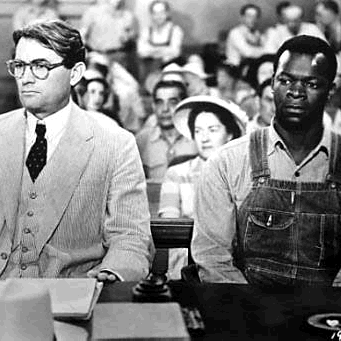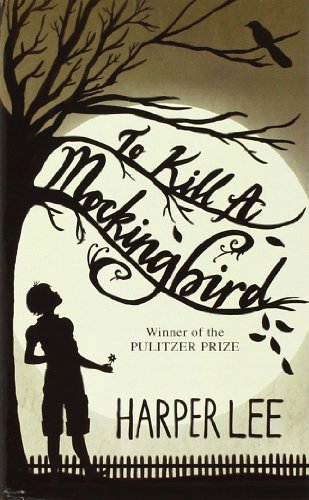A promotional still from the film To Kill a Mockingbird (1962) with Gregory Peck and Brock Peters. Image via Wikimedia Commons.
BY BEENISH AHMED
In a moving farewell address, President Barack Obama offered insights on the defense of democracy in troubled times, expressed gratitude for his family and staff, and delved into into a well-trod literary debate.
“Social attitudes oftentimes take generations to change,” he said from behind a podium in Chicago’s McCormick Place. “But if our democracy is to work the way it should in this increasingly diverse nation, then each one of us need to try to heed the advice of a great character in American fiction, Atticus Finch, who said ‘You never really understand a person until you consider things from his point of view, until you climb into his skin and walk around in it.’”
Finch, the dignified lawyer of the American literary classic To Kill a Mockingbird by Harper Lee has been presented in classrooms across this country as a paragon of empathy.
Go Set a Watchman, an earlier draft of Mockingbird published decades later, features Scout as an adult rather than the child learning lessons in right and wrong from her father. For many, Watchman, which was published in 2015, sullied Finch’s moral character with the taint of racism. Some scholars of literature, however, have argued that he was never meant to be put on such a pedestal.
Far from exhibiting a belief in racial justice, Finch excuses racism throughout To Kill a Mockingbird argues Malcolm Gadwell in the New Yorker. He offered the following analysis of a scene from the middle of the novel as one example of Finch’s racial bias:
[A]fter Tom Robinson’s arrest, Finch spends the night in front of the Maycomb jail, concerned that a mob might come down and try to take matters into its own hands. Sure enough, one does, led by a poor white farmer, Walter Cunningham. The mob eventually scatters, and the next morning Finch tries to explain the night’s events to Scout. Here again is a test for Finch’s high-minded equanimity. He likes Walter Cunningham. Cunningham is, to his mind, the right sort of poor white farmer: a man who refuses a W.P.A. handout and who scrupulously repays Finch for legal work with a load of stove wood, a sack of hickory nuts, and a crate of smilax and holly. Against this, Finch must weigh the fact that Cunningham also leads lynch mobs against black people. So what does he do? Once again, he puts personal ties first. Cunningham, Finch tells his daughter, is “basically a good man,” who “just has his blind spots along with the rest of us.” Blind spots? As the legal scholar Monroe Freedman has written, “It just happens that Cunningham’s blind spot [...] is a homicidal hatred of black people.”
The exchange demonstrates how willing Finch is to empathize with fellow white men. He does not, however, readily extended empathy to the black characters of To Kill a Mockingbird.
Although he is obligated to provide legal defense for Tom Robinson, a black man accused of raping a white woman, Finch doesn’t care to “climb into his skin and walk around in it” as he advises his daughter to do. Nor does he bid the jury to whom he’s appealing for Robinson’s life to empathize with him.
"Neither the jury nor the audience of the novel have learned anything about Tom [Robinson]: where he lives, what his family is like, how he treats his wife and children and others in his daily life,” novelist and former law professor Katie Rose Guest Pryal wrote in a 2010 paper examining the role of empathy in Mockingbird.
While Finch takes pains to describe the character and circumstance of the woman who Robinson is accused of raping, he doesn’t offer any such details about Robinson aside from the physical fact of his lame arm. By withholding information about Robinson as a person, Finch blocks all entry points for empathy.
Finch’s defense of Robinson is based more on his own moral standing than anything related to a black man in the Jim Crow South, according to Pryal: “At the end of the closing statement, when Atticus tells the jury to believe Tom Robinson, he is actually commanding the jury -- and readers -- to believe Atticus Finch.”
The Finch who accepts the status quo of racial injustice instead of disrupting it is the Finch who is fully realized in Watchman and only thinly veiled in Mockingbird.
Despite the “revision” of Finch as a racial accommodationist in Watchman, Obama invoked the glorified version of the Southern lawyer of Mockingbird who has, for decades, been incorrectly read as a civil rights hero.
Obama’s reference to Finch’s oft-cited appeal for empathy is especially notable given the president’s own outspoken belief that the law ought to focus on human understanding above legal minutia.
In her paper on the “failure of empathy” in Mockingbird, Pryal cited Obama’s views on the law as a sort of foil to Finch’s practice of it by highlighting his remarks regarding nominating a Supreme Court justice.
“I will seek someone who understands that justice isn’t about some abstract legal theory or footnote in a case book,” Obama said in 2009. “It is also about how our laws affect the daily realities of people’s lives -- whether they can make a living and care for their families; whether they feel safe in their homes and welcome in their own nation.”
For Obama, Pryal noted, “real justice is empathetic, not abstract or blind.”
And yet, in his final address as President of the United States, he made reference to a character who preaches empathy, but allows himself blind spots.




